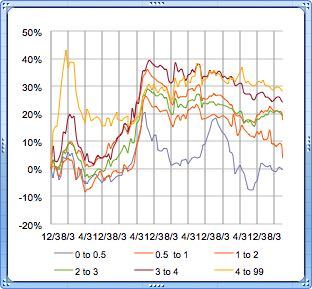Diamonds are a difficult item to buy in the best of circumstances. For most shoppers it’s one of the most expensive purchases of their lives and it’s aggravatingly necessary to rely on the advice of salespeople who may not have your best interest at heart when they tell you that something is a fabulous deal. The Internet merchants come with their own risks of providing a credit card, waiting for delivery and the ever present possibility that you will need to make a return and collect a refund. Here are some tips on buying diamonds safely, both online and on the street.
#1 Learn the language and educate yourself.
Diamonds range in prices from remarkably cheap to fantastically expensive. To be a savvy diamond shopper, you simply must learn what the difference is. The language of diamonds is different than anything else you’ve ever found and a lot of the terms, like ‘almost flawless’ and ‘ideal cut’ don’t always mean what you think. Read the advanced tutorial from top to bottom. Read some of the questions and answers in the forum called ‘Rocky Talky’. Lots of people have passed this way before you and they may have asked the very same questions that are bugging you. Aside from helping you to describe to the salespeople what exactly you want, it will help you recognize when someone is feeding you a line.
#2 Buy ‘certified’ stones.
There are independent labs that grade some of the key attributes of diamond grading and pricing and it helps to narrow down the stone. The reports that come with lab graded stones are popularly known as Certificates or Certs and more accurately called Lab Reports. The lab used should be well established and recognized as independent. GIA and AGSL both enjoy an excellent reputation in the United States and HRD is well established in Europe. Other major labs include EGL International, EGL USA, IGI and DCLA just to name a few. It’s important to understand that all labs are not the same and that these reports do not come with a financial guarantee. There’s a section in the tutorial about reading a lab report and what is and what is not contained in one.
#3 Shop for the dealer as carefully as you shop for the stone.
Not everyone is looking for the same things in a dealer but there’s one big issues that come to everyone’s mind. Can they be trusted? Talk to them on the phone, by email or visit their store to get a feel for how they communicate with you. If they have a website, read through the details carefully. Pay special attention to the educational content and the terms of sale. If they have a storefront that’s reasonably close to you, pay them a visit and talk to them about diamonds. Listen to what they tell you, look at what they show you but don’t buy anything yet, no matter how attractive it seems. You’ll have time. If they don’t feel like someone you want to do business with, trust your gut and move on to the next. When you finally find yourself comfortable with one, do a bit more research. Search the forum for their name to see what has gone ahead of you. If they aren’t there, consider posting your own question about who has shopped there and how it went for them. Check their records with the Better Business Bureau and RipOff Report. Ask your friends and coworkers where they’ve shopped and how it went.Be careful of relying on the ebay feedback system.Although a good clue, don’t rely on it exclusively.Each dealer should be held to the same high standard and ebay merchants are no exception.Remember that what you’re trying to assess is the character of the people behind the keyboard/counter.
#4 Read the fine print.
The ‘terms and conditions’ section of the website or advertisement and the signs at the store are important. If you end up shopping there they will become part of your contract and you are supposed to understand it. Read them and understand them before you even consider buying. Special things to look for are the amount of time you have to make a return if you are unhappy and what limitations they put on this, what warranties and guarantees are included and how those are limited and what additional spifs do they offer like trade-in programs or financing that may be of value to you. Often these things are written in cryptic language and there are always certain limits. If you don’t understand ask. If you still don’t understand walk or click away. Print out and save a copy. As with many things in this business, different dealers’ terms get discussed quite a bit in the forum. Things like what is a reasonable return policy, how the tradeup programs work and what sorts of discounts might be available are common topics.
#5 Ask questions
Most websites and all stores have salespeople who are there to explain to you why you should buy what they have to offer and why you should buy it from them.All you have to do is ask.Some will say that they’re cheaper or have a better selection, some will say that their designers are more skilled or work faster.Each is different and each will be trying to convince you that there own special program is the one to go with.Since you already went through step #2 above (learn the language) you know what to ask about and you’ll understand what they tell you.You’ll also understand when they stretch the truth a bit too far.
#6 Pick stones and Compare Prices
By now you’ve probably already done this. Everybody wants a good deal. If you’ve narrowed down what you want, it’s easier than you might have thought. Start by searching here for offers of similar stones. Make sure that you’re comparing not just similar weight/clarity/color but stones that are similar in cutting and lab grading as well. If you find a stone offered for sale from a competitive dealer, ask your chosen dealer about it. They may be able to match the price, they may be able to explain why theirs costs more, they may even be able to get that very stone. The prices advertised here are generally very competitive and, at the least, you will have learned a bit more about where your dealer fits in pricewise and you may have found a new dealer that’s worth your consideration. Most dealers, especially the Internet savvy folks will be able to give you quite a bit of information about your stone ranging from the specs of the stone to the results of various tests, ASET and Idealscope images and scans of the lab reports. If you’re still not sure, go back to the forumand ask the team what they think.
#7 Independent Appraisers.
When you finally narrow it down to one or two stones, it’s time to hire a pro. Independent appraisers are folks who offer professional advice as a business rather than as a sideline to trying to sell you something. Choose one with impeccable gemological credentials and a fully equipped lab who can look over your choices with an experienced eye and who can give you an unbiased answer to the nagging questions that you still have left. Many can offer additional tests beyond what the dealer has offered and all can provide a second opinion about what you’ve been told and what might have been omitted from the sales presentation. Most dealers will agree to give up to 30 days to have your stone inspected by our own expert and many will even agree to ship it to the appraiser f your choice before you even need to pay for the stone! There is a list of independent appraisers here. A special warning about independent appraisals in order. YOU need to choose who the appraiser will be, not them. If the appraisal comes ‘free’ with the purchase, it’s not independent, even if it’s signed by a qualified appraiser. If it’s signed by the seller or someone who works for the store, it’s not independent. Lastly, if the appraiser tries to steer you into returning it and buying something else from them it’s definitely not independent.
#8 Credit Cards and Banks
Your credit card company is your friend and if you’re buying for the first time from a new store you should take advantage of it.Many of the most price competitive dealers will offer a discount of a few percent for paying cash or by wire transfer.On a big diamond deal this can turn out to be quite a bit but what you lose is the leverage the CC company gives you if there’s a problem.Credit cards are not all the same about this and the terms will be in you card agreement.If you’re in doubt (which is nearly certain given the way these contracts are written), call up the company using the number on the back of the card and ask them about their purchaser protection programs.
#9 Shipping Safely
If you’re buying from a local store and using a local independent appraiser, shipping isn’t an issue but an increasing number of customers want to buy from an Internet advertiser because of the attractive selections and prices or use an out-of-town appraiser (or both) and shipping is necessary.
Most of the dealers are well experienced with the process and a US dealer shipping to a US address will use Federal Express or UPS overnight services.A few will use the overnight service from the US Post office or registered mail.In almost all cases they will have separate insurance that allows them to use services that aren’t available to consumers.You will need to sign for the package and in many cases you will need to go down to the local FedEx office to get it.If you need to return ship and you’re in the US, most will ask you to use registered mail through the US postal service and will provide you with specific packing instructions.If you’re shipping from overseas, ask your dealer for specific instructions.Make sure you understand the return rules regarding deadlines, packing and insurance and keep copies of everything.
When the package arrives, inspect it carefully before signing for it.If it shows signs of tampering, don’t accept it.Let FedEx keep it for now and call the shipper immediately for further instructions.Most of these things are double
#10 Insurance
Most jewelers have insurance for their diamonds while they are in their possession and they will buy insurance for while it’s being shipped to you or your appraiser. This ends as soon as you sign for the package. For this reason, don’t accept the package if there is evidence of damage and take good care of it while you have it. If you lose it or damage it before you can ship it back or can get back to the store, it’s your loss. Most insurance companies won’t insure a loose diamond so there’s a window between when you pick it up at the store or sign for the shipment and when you get the appraisal report to your insurer where you’re not insured. For some this is an acceptable risk and they solve it by simply being careful. For others this is a source of great stress. If you’re concerned, have the jeweler ship it directly to your chosen appraiser and have the appraiser deliver the report to you electronically. You can forward the appraisal directly to your insurance company and the policy will already be in force when you receive the package. Your jeweler also may be able to provide you with sufficient paperwork for your insurance before you pick up the ring and you can deliver this to your insurance agent along with payment of the premium to have the policy start immediately. Call your agent and ask about the rules for your particular company.
SUMMARY
Buying a diamond can be a stressful experience but it doesn’t have to be a risky one. New information channels and distribution methods over the Internet have expanded the possibilities for where and how you can shop resulting in an amazing selection, unprecedented transparency and incredibly competitive prices. Along with this expansion have come some pitfalls that shoppers didn’t consider even a few years ago. The rewards for careful and safe shopping are considerable and can be seen in better diamonds, better prices and better service, both online and at your local jeweler. The power is in your hands. Shop safely.
by Neil Beaty
Professional Appraisals in Denver
http://www.americangemregistry.com/

Discuss Here











